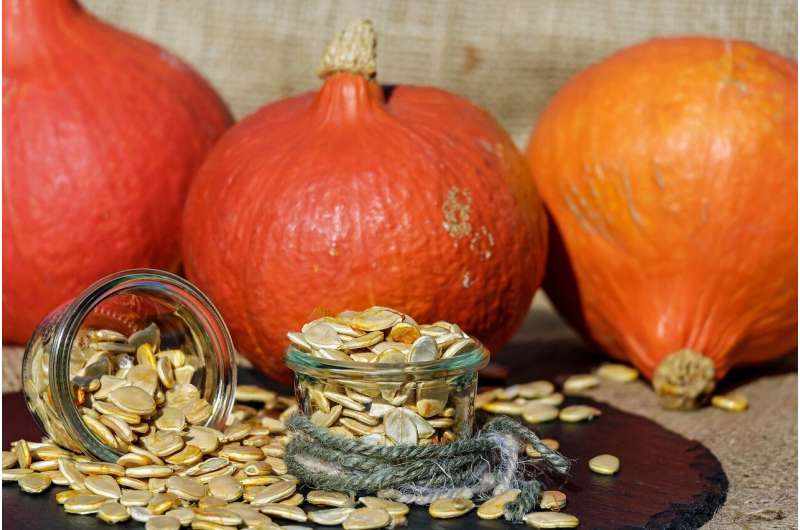This article has been reviewed according to Science X's editorial process and policies. Editors have highlighted the following attributes while ensuring the content's credibility:
fact-checked
reputable news agency
proofread
On nutrition: Don't toss those pumpkin seeds

It all started with a question from a reader in Missouri: "Can pumpkin seeds minimize an overactive bladder? Is it better to eat ground-up pumpkin seeds or whole seeds? How much is advisable?"
Sure enough, there is evidence that pumpkin seeds—more specifically the oil in pumpkin seeds—may help treat what is known as overactive bladder syndrome (OAB).
This condition affects men and women alike, according to a 2018 review in the journal Current Urology. Along with medications and other treatment strategies, these experts also recommend people with this condition to stop smoking, get their weight down, and avoid alcohol, caffeine and acidic foods.
Where do pumpkin seeds come in? The natural oil in pumpkin seeds is rich in compounds called phytosterols. These and other substances in pumpkin seeds have shown promise in the treatment of OAB, according to a 2019 review published in Food Reviews International.
Besides its healthful oil, pumpkin seeds possess other nutritional benefits. The Linus Pauling Institute at Oregon State University lists pumpkins seeds as a good source of iron—a vital nutrient that supports our immune system. These experts also specifically recommend pumpkin seeds as a quality source of magnesium, a mineral we need to fortify our nerves, muscles and bones.
Pumpkin seeds may also provide some relief for men with an enlarged prostate gland, a condition sometimes related to OAB. While good studies on this are few, there have been at least two randomized, placebo-controlled trials using pumpkin seed extract to treat the symptoms of an enlarged prostate.
A 2022 analysis of these studies in the journal Clinical Phytoscience concluded that patients with this condition "may benefit" from 500 mg of pumpkin seed extract two times a day.
Ground or whole? You'll get the beneficial ingredients in pumpkin seeds either way. And if you eat the entire seeds rather than just the oil, you'll get the added benefits of dietary fiber and other nutrients that reside naturally in the seed.
A daily serving of pumpkin seeds is about 1/4 cup (30 grams). This may be a good place to start unless you've been advised otherwise. As always, the complete nutrition in seeds is usually better (and safer) than to buy isolated oils in supplements. So if you haven't yet tossed the seeds from your pumpkins, here's how to roast them, compliments of Country Living magazine:
Place pumpkin seeds and pulp in a big bowl of water and stir. The seeds will float to the top and the pulp will sink to the bottom. Carefully transfer the seeds to a paper towel-lined plate or baking sheet. Pat dry. Toss seeds with oil and light seasonings and roast at 350 degrees until crisp (about 15 minutes).
2023 MediaNews Group, Inc. Distributed by Tribune Content Agency, LLC.


















